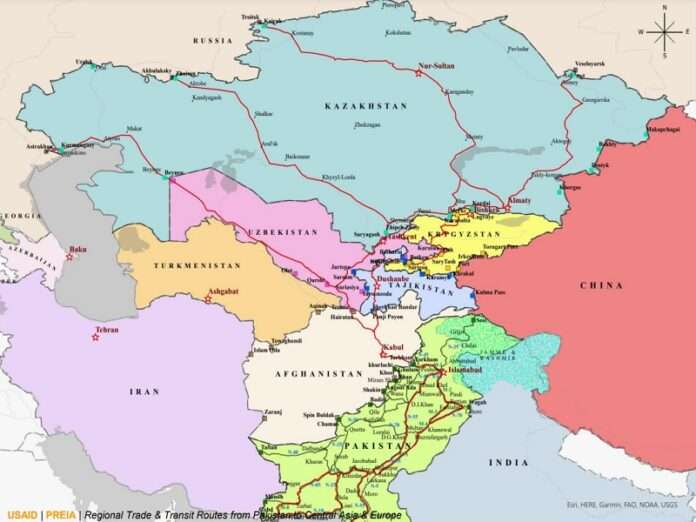The Pakistani Energy Minister was fact-checked last month here for claiming that his country’s stalled Pakistan Stream Gas Pipeline with Russia might expand across South Asia. A few weeks later, Pakistan’s Minister of Maritime Affairs must also be fact-checked after making a similarly misleading statement about Russia, this time about it and the Central Asian Republics (CARs) allegedly preparing to rely more on Pakistani ports for foreign trade. This is wishful thinking at best for the reasons that’ll be explained.
For starters, it was already assessed in summer 2023 that “PAKAFUZ’s Connectivity Potential Is Totally Dependent On Troubled Pakistani-Taliban Ties”, which refers to the planned Pakistan-Afghanistan-Uzbekistan railway for connecting the CARs and eventually Russia with the Indian Ocean. For as logical as PAKAFUZ is, it’s hamstrung by rapidly worsening Pakistani-Taliban ties, especially over the past few months. Not even China has been able to de-escalate tensions between its two regional partners.
They’re quickly approaching the breaking point after Pakistan recently carried out airstrikes against what it claimed was a terrorist-designated TTP training camp in Afghanistan, which prompted the Taliban to retaliate with an alleged cross-border raid. To make matters even more complicated for Pakistan, its ties with the US might also soon worsen as suggested by the latest sanctions against its state agency involved in ballistic missile production and one of Trump’s aides demanding Imran Khan’s release from prison.
Even if Pakistani-Taliban ties were to magically improve, the US might still ramp up its pressure against Pakistan, which could take the form of trying to impede its ambitious plans for pioneering overland connectivity with Russia and the CARs. Accordingly, those countries don’t consider Afghanistan and Pakistan to be reliable conduits to the sea for scaling their foreign trade, instead naturally preferring the North-South Transport Corridor (NSTC) through Iran.
Although Iran might soon come under even more American pressure than Pakistan if Trump revives his “maximum pressure” policy against it, the precedent of waivers being given to India for its trans-Iranian trade to Afghanistan could be replicated with regard to the CARs in order to assist their balancing acts. To elaborate, it’s in the US’ interests to help these countries expand their foreign trade partners in order to reduce their economic dependence on China and Russia, ergo the role that India can play via the NSTC.
Russia is already sanctioned to the hilt so there’s not much else that the US can do to try to curtail its exports, but it might be willing to let Iran continue facilitating the CARs trade with India and others through sanctions waivers due to worsening Pakistani-Taliban ties impeding PAKAFUZ’s viability. The potential ramping up of American pressure on Pakistan under Trump 2.0 over its ballistic missile program and Imran Khan also further incentives the US to prevent Pakistan from playing this role at least for now.
Circling back to what its Minister of Maritime Affairs said, he was either engaging in wishful thinking at best or had ulterior motives behind talking about Russia and the CARs relying more on Pakistani ports for foreign trade, which could be attributable to his country’s newly troubled ties with the US. For instance, his government might think that discussing this possibility could convince the US not to pile on any more pressure out of fear that it could pivot towards Russia, but the US knows better than to fall for that.
While it was recently argued here that the US tacitly approves of their plans to have Russia modernize Pakistan’s resource sector in order to lessen its dependence on China, there are clear limits to how far it’ll allow the Russian-Pakistani rapprochement to develop. No anti-American pivot is possible since Pakistan’s economy is dependent on foreign institutional support from the US-controlled IMF and World Bank that obviously comes with political strings attached.
The US can therefore inflict devastating damage to the Pakistani economy by interfering with those two’s programs to that country as political retribution for its leadership refusing to capitulate to its demands. For this reason, any potential intent on its Minister of Maritime Affairs’ part to signal a possible anti-American pivot to Russia in the event that the US applies more pressure upon Pakistan in the coming future is exposed as unrealistic, thus neutralizing its purpose in preemptively averting that scenario.
All in all, while it makes economic sense for Russia and the CARs to rely more on Pakistani ports for their foreign trade, it’s not politically feasible at present for the reasons that were explained. These inhibiting factors will likely remain relevant for some time so the odds of this happening anytime soon are low. Nevertheless, the CARs can probably lobby for US sanctions waivers for allowing them to use the NSTC via Iran for expanding trade ties with India, which Trump might grant them for anti-Chinese purposes.







